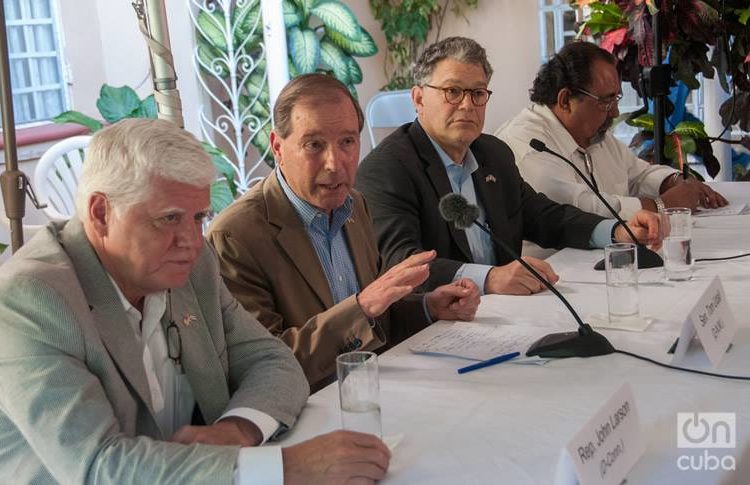“I’m optimistic that we are going to move forward, the question is how quickly,” said Sen. Tom Udall (Dem-N.M) in reference to the process of normalization of relations between the United States and Cuba at a press conference in Havana.
Sen. Udall, who is leading a delegation of democrat representatives currently visiting the island nation, said that he thought it would only be weeks to the normalization.
This opinion was voiced shortly after ABC News announced in a report that “two sources close to the negotiations” had said that Cuba and the United States were expected to formally announce the re-opening of embassies in Havana and D.C. next week.
The senator noted that such a step would be followed by “the tough work” of getting Congress to lift the embargo.
“In the Senate we are doing that with specific pieces of legislation: the elimination of the travel ban, the Cuba DATA Act, the elimination of agriculture restrictions,” he said.
“Today in the Foreign Relations Committee, a majority of Democrats and Republicans support dropping the travel ban,” added Sen. Udall when explaining the reasons he had to be optimistic about this issue. “We are at a point where bipartisan support is growing [in Congress]. It doesn’t mean it’s going to happen tomorrow, but the steps are taking place.”
“We are making a lot of progress but we have a lot of work to do,” he added.
In this connection, he said that two possible areas for the United States and Cuba to cooperate on were tourism and cultural exchange. He used the example of an artist from his state, Agnes Chavez, who is one of five American artists taking part in a joint project with five Cuban artists at the 12th Havana Biennial.
“Cultural exchange can deepen the friendship and the understanding,” the senator said. “And many of the cultural changes can break down the barriers better than almost anything.”
The senator described this visit to Cuba as “very productive,” and said that it had included meetings with ministers and officials in the Ministry of Foreign Trade and Investment, the Ministry of Foreign Relations and the Ministry of Agriculture.
He also mentioned meetings they had held with Cuban “cuentapropistas” —as people who are involved in small cooperatives or self-employed are known locally.
His delegation, which includes U.S. Sen. Al Franken (D-Minn.), U.S. Reps. Raúl M. Grijalva (D-Ariz.) and John Larson (D-Conn.), also met with businesspeople from foreign countries who are doing business in Cuba, to “try to get a sense of the business climate.”
They had a very small visit with Cardinal Ortega, said Udall, who also highlighted the role played by Pope Francis in terms of helping bring the presidents of the two countries together to proceed on the normalization.
“I think we can bring a lot to Cuba in the area of agriculture and trade,” said Sen. Al Franken specifically in reference to his state, Minnesota. “If the embargo is lifted there will be many opportunities to do business here.”
Reps. Raúl M. Grijalva recommended to increase contacts between Cuban and American officials. “The more the American leadership of the United States comes in contact with the leadership and the people of Cuba, the better for the normalization process in the long run.”
When asked about Charlie Hill, a man wanted in the United States for the murder of a police officer in New Mexico, Udall said that he hoped that, as a result of the normalization process, Cuba and his country would be able to do in the future what countries normally do: extradite the people who have violated the law.










